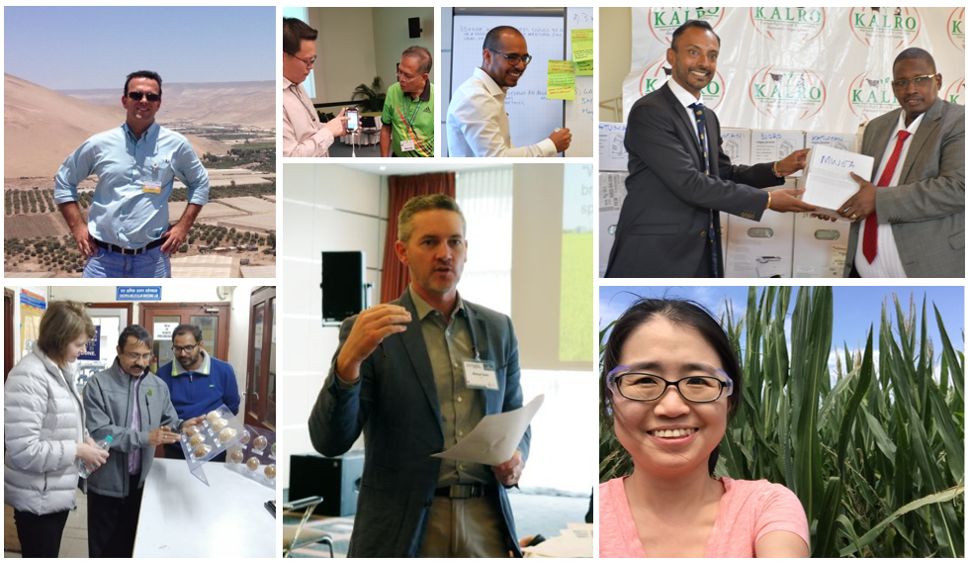
Please see our team bio page.
Combining culture change with technical innovations may be the most challenging part of modernization breeing programs. Working with partners across CGIAR and externally to catalyze this change, the CGIAR Excellence in Breeding (EiB) Platform has been adapting its approaches. The EiB team is designed to support and augment the talented breeders and leaders across CGIAR and NARS. And it continues to add and reallocate key talent to help CGIAR meet six funder requests aimed at boosting delivery of the highest possible rates of genetic gains in farmers’ fields.
Initially conceptualized as a one-stop-shop for tools and services to help breeding programs modernize, EiB has expanded its mandate toward more holistic relationships with breeding programs. This is crucial as CGIAR breeding programs move toward a more unified One CGIAR model.
EiB's Deputy Director joined last year to oversee EiB’s operations and team. Jan Debaene previously served with EiB partner ICRISAT as Head of Breeding, and worked in the private sector.
“EiB can help with proven steps, backed up by science,” says Debaene. “From developing product profiles to simulations to data management, it’s important to implement the full suite of technologies and best practices. That holistic approach is what will vault breeding programs to the next level.”
Organized as five modules, the Platform works with breeders to improve product design and management, breeding scheme optimization, genotyping and sequencing, operations and phenotyping, and bioinformatics, biometrics and data management. The modules are interlinked, offering services and tools within the full relationship.
Module leadership includes Young Wha Lee, a former private sector data scientist, as primary data module lead. The data team is developing a powerful data management platform called Enterprise Breeding System (EBS), which aims to improve breeding accuracy, speed and quality, as well as significantly free up breeders’ time. And leading the genotyping and selection module is Eng Hwa Ng, who negotiates access to world class genotyping services at reduced costs for partners, while organizing training in genotyping and marker applications.
Modernizing and innovating breeding programs
The EiB Platform is a response to the need in developing countries for breeding programs to deliver higher rates of genetic gain and increase variety turnover in order to meet the global food needs of up to 10 billion people this century. With increasing climate change challenges and natural resource constraints, this is no simple task. The Platform aims to increase the rate of genetic gain in productivity on-farm by 1.5% annually, through supporting breeding modernization initiatives with CGIAR and at local levels working through national agricultural research systems (NARS). This is partly driven by the Crops to End Hunger (CtEH) program, through which donors are pushing breeding programs toward modernization and improved results.
“Ensuring we have the most modern and innovative crop breeding programs in the world means more than just offering tools and services,” says Program Director Michael Quinn. “It means full-fledged partnerships where we can offer some of the best people, programs and resources in the business.”
Integrating the latest breeding technologies in ways that result in meaningful increases in genetic gain per dollar invested is complex and difficult. Some programs and organizations will have to undergo serious cultural changes. But they will be well-placed to manage these changes with access to their own rich histories and human resources, as well as EiB’s team and support.
Building the right team of experts
The team is drawn from across CGIAR, CIMMYT, IRRI, ICRISAT and Cornell University. Here is a summary of key EiB personnel, highlighting more recent changes and additions:
- Program Director Michael Quinn is focusing on strategy, supporting Center leadership, and engaging with donors and major partners. Jan Debaene is Deputy Director overseeing the team internally to ensure progress on workplans.
- Module 1, Product design & management: Peter Coaldrake is the module’s focal point and he has been joined by a Strategic Crop Market Economist and a Seed Marketing Strategist.
- Module 2, Breeding scheme optimization: Eduardo Covarrubias is being supported by Dorcus Gemenet and her computer simulation skills. Sarah Hearne and Mike Olson now also lead work on upstream trait discovery and gene mining of novel germplasm. The team also has two Quantitative Genetics Specialists.
- Module 3, Genotyping and sequencing: Eng Hwa Ng is now leading this work, with support from Ana Oliveira as Regional Genotyping Coordinator for Africa.
- Module 4, Operations and phenotyping: continues to be led by Gustavo Texiera, with support from: network leads, two mechanization support positions, trial experts, and irrigation and soil management consultants to increase plotmanship and support needs identified during assessments of 25 breeding stations.
- Module 5, Breeding informatics: led by Young Wha Lee, is coordinating the data management strategy and network, along with working across the Enterprise Breeding System (EBS) team.
- NARS outreach: Bish Das leads the extension of EiB activities to local institutions and the National Agricultural Research and Extension Systems (NARS) primarily on the African continent.
- Adoption & outreach: Liz Jones is outreach liaison to help partners adopt and operationalize processes, systems and tools.
- Breeding change implementation support: Bodo Trognitz is a breeding optimization specialist supporting implementation including effective Crops to End Hunger resource utilization, with a focus on priority programs in Africa. He is joined by Dragan Milic and Mark Dieters. The team serves as EiB’s eyes and ears so that the Platform knows how to best support breeding teams.
- Toolbox: Sarah Hearne continues to lead EiB’s efforts to create and curate the best tools for breeders to improve program performance.
- Communications: Adam Hunt leads global communications efforts, joining from CGIAR Water, Land and Ecosystems (WLE).
Please see our team bio pages for other talented team members and updated info on the EiB roles.
Please contact us for more information or if you would like to engage with the team: Excellence-In-Breeding@cgiar.org